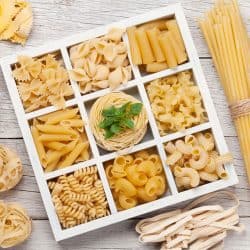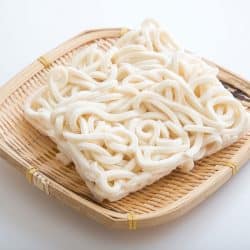Making attempts at creating homemade pasta has become increasingly popular. A common question, though, is how to store these noodles. Store-bought pasta is a staple that can be kept in a pantry for months. Homemade noodles, however, can be a bit more tricky. We've done the research to guide you on how to store your noodles for the longest shelf life.
You can store pre-cooked homemade noodles by drying or dehydrating them, then placing them in a sealed container in a dry, dark area. Also, store pre-cooked homemade noodles by drying the noodles and placing them in a sealed freezing container in the freezer.
You can store cooked homemade noodles by placing them in a sealed freezing container in the freezer or an appropriate storage container in the refrigerator.
So now you know how your homemade noodles can be stored, but perhaps you need more detailed instructions. Keep reading to learn more as we discuss everything from drying techniques to container recommendations to homemade noodle shelf-life.

Contents
Storing Pre-cooked Homemade Noodles
Store-bought pasta is typically made with preservatives to increase its shelf life, but this is not the case with homemade noodles. While this is beneficial for both overall health and taste, it can complicate the question of how and how long to reserve these noodles.
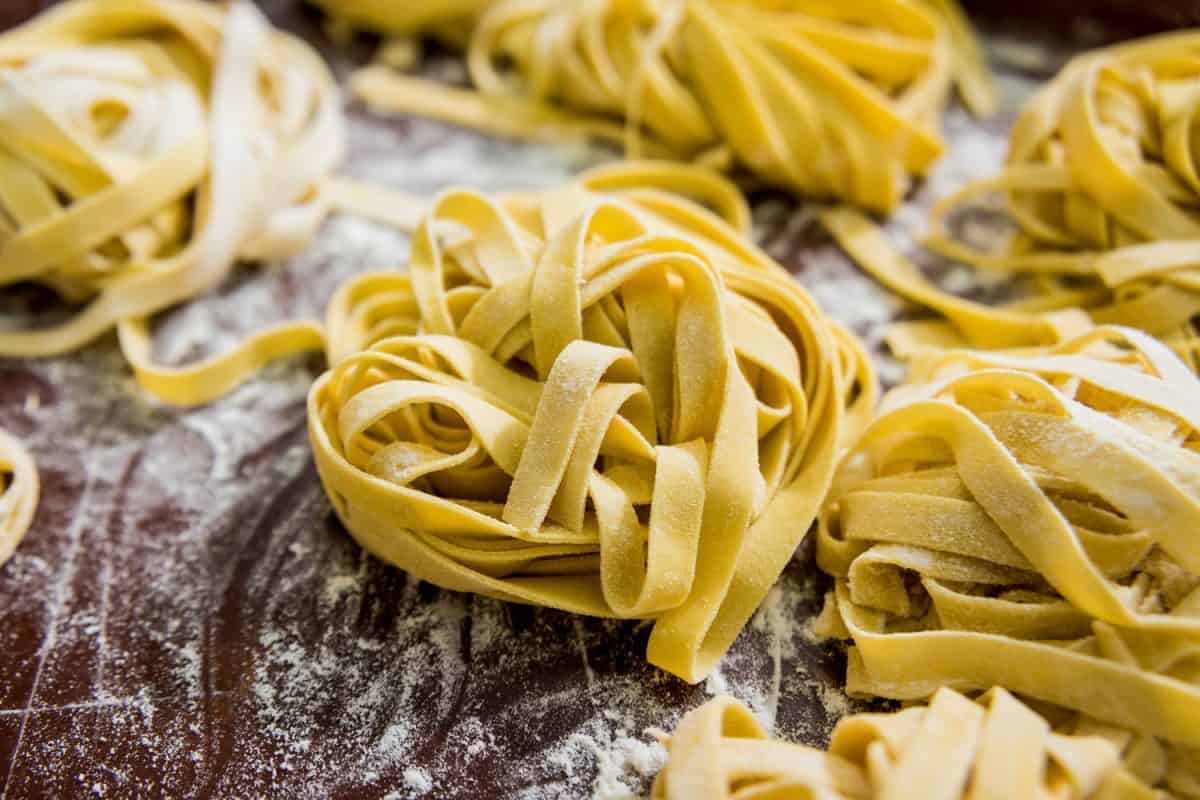
In The Pantry
Ready-made pasta is usually made to store in the pantry, and thankfully, you can do this with homemade noodles, too. No matter what, the noodles will need to be thoroughly dried.
You can do this with a reserved area and a pasta drying rack. Though, hanging the noodles over chairs and grills works just as well.
Check out this pasta drying rack on Amazon.
Creating nests out of long noodles, such as spaghetti or fettuccine, may also be preferable. You can place these clusters of pasta on wax paper to dry.
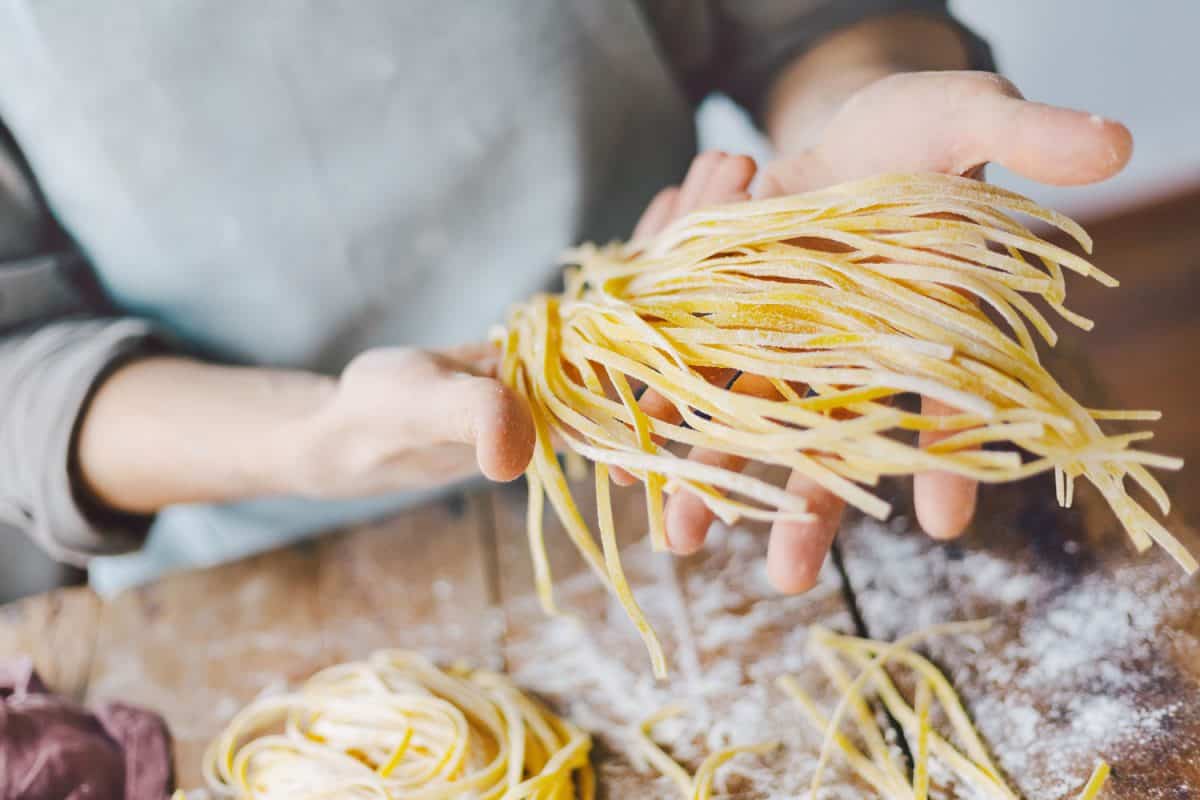
In The Freezer
A freezer is an excellent option for increasing the shelf life of most any food, and pasta is no exception. To store pre-cooked noodles in the freezer, you will want to dry or dehydrate the noodles using the same methods outlined above.
Then, you will place the pasta in a freezer-safe container. While freezer bags are acceptable, we recommend sturdier containers in this case. This is because dried and dehydrated noodles are brittle and break easily, so they need protection from other items being moved and tossed about in the freezer.
Check out these freezer-safe containers on Amazon.
Storing Cooked Homemade Noodles
In The Refrigerator
Cooked pasta can be stowed away in the refrigerator as long as you are sure to use the noodles in five days' time. Homemade pasta actually lasts a bit longer in the refrigerator than the store-bought brands.
To refrigerate the noodles, you must first be sure that they are sufficiently cooled. This can be done quickly by placing them in a colander and rinsing them with cool water.
Once they are at least at room temperature, they can be placed in an airtight container with sauce, broth, or drizzled with plant-based oil. This will prevent them from sticking and drying out.
In The Freezer
Just as with the refrigerator, cooked noodles should be cooled before freezing. This can be done using the same method that is mentioned above.
In addition, these noodles should be stored in a freezer-safe container with a source of moisture, such as sauce, broth, or plant-based oil.
Unlike pre-cooked noodles, pasta that has already been cooked is not brittle and not in danger of breaking. Because of this, freezer bags are a perfectly acceptable storage container.
Take a look at these reusable freezer bags on Amazon.
How Long Do Homemade Noodles Last In The Freezer?
Pre-cooked Noodles
Fresh noodles that have been dehydrated before storage can be expected to last up to six months before beginning to spoil. Noodles that have only been dried may only last for three months.
Cooked Noodles
Cooked pasta has a shorter shelf life in the freezer. On the shorter side, the noodles may last two months. On the longer side, you could see your noodles lasting three months before needing to be reheated.
Related Questions
Can You Leave Homemade Noodles Out To Dry Overnight?
Yes, you can! Noodles often need 24 hours to dry out completely. Chances are, you will have to get some sleep at some point. As long as your noodles are in a dry, clean area, this is no problem. You may also have to turn the noodles every few hours and add flour to prevent them from sticking to the surface they are lying on.
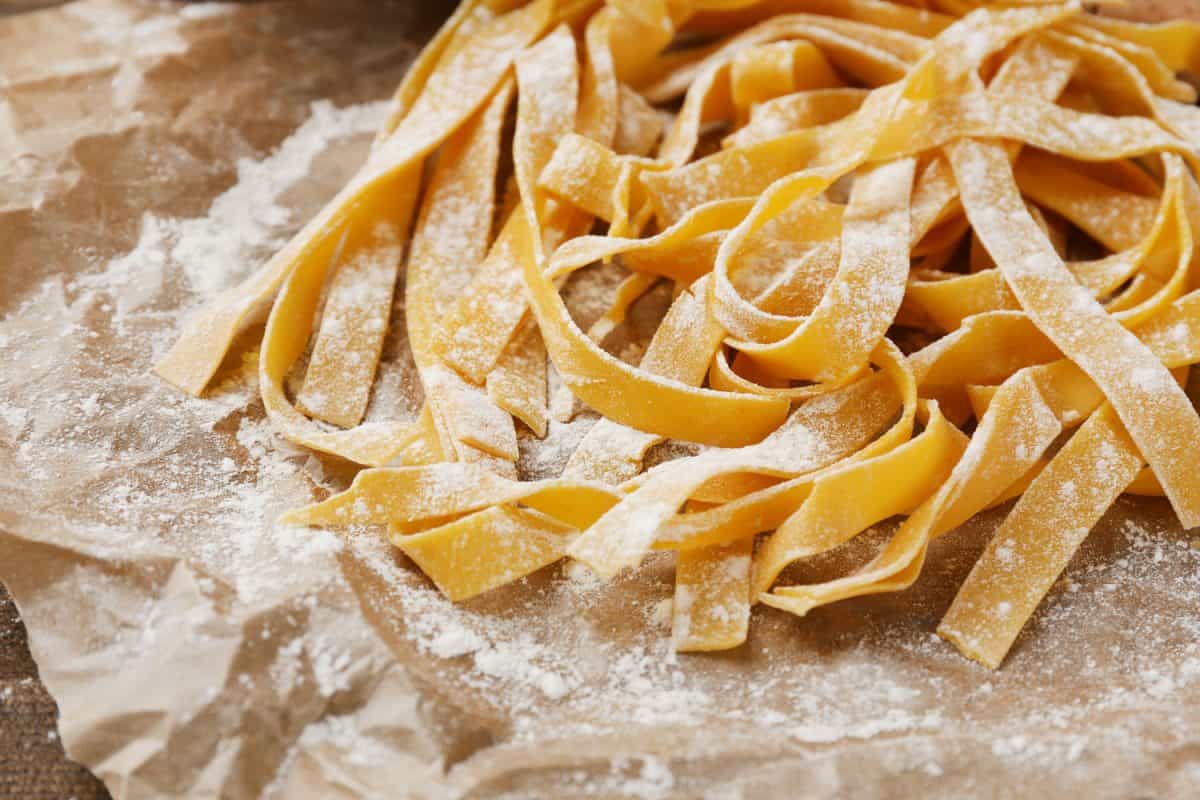
How Long Can You Keep Homemade Noodles?
This is dependent on the way the noodles are prepared and stored:
- For precooked noodles, dried and kept in a pantry, the shelf life is about 3 weeks.
- For precooked noodles, dried, dehydrated, and kept in a pantry, the shelf life is about 2 months.
- For precooked noodles, dried and frozen, the shelf life is about 3 months.
- For precooked noodles that have dried, dehydrated and frozen, the shelf life is about 6 months.
- For cooked noodles kept in the refrigerator, the shelf life is about 5-7 days.
- For cooked noodles kept in the freezer, the shelf life is about 2-3 months.
Do Homemade Noodles Need To Be Refrigerated?
Homemade noodles that are not yet cooked should not be kept in the refrigerator. Rather, they should either be dried, possibly dehydrated, and then stored in a pantry or freezer.
Homemade noodles that have been cooked should, at the very least, be refrigerated. They cannot be left out or stored in a pantry. For longer shelf life, though, they should be kept in the freezer.
How Do You Store Sauce On Noodles?
When noodles are refrigerated, it may be preferable to store the pasta and sauce separately. This is because the moisture in the sauce may cause the pasta to become too soft over time.
However, one may still decide to store the sauce with the noodles if it will be eaten within a day, and in this case, the noodles and the sauce should be mixed together thoroughly.
When you store noodles in the freezer, the sauce and noodles can be mixed and placed into a freezer-safe container.
How Can You Tell If Noodles Have Gone Bad?
If homemade noodles have gone bad, there will be tell-tale signs in their texture, smell, appearance, and taste. Of course, we recommend observing the pasta before resorting to tasting it.
Noodles that have begun to spoil will often become very slippery and even crumbly as if they are beginning to decay. Their color may also have changed, becoming more white or yellow. You may also notice an unpleasant odor.
If you truly must, you can taste the noodles to be sure that they have gone bad. Noodles that are bad will have lost their original taste and will be stale.
In Closing
Making your own pasta is an ambitious task to attempt. It's a lot of work, so it makes sense that you will want to keep your homemade noodles for as long as possible.
For pre-cooked noodles, you will either want to dry or dehydrate them before storing them in an airtight container in the pantry or freezer. For cooked noodles, you must store them in the refrigerator or freezer with a sauce, broth, or plant-based oil.
Learning how to store your noodles properly is the best way to ensure that you will have delicious, fresh noodles when you need them.
Want to learn more about how to store your meals? Visit these related posts:
What Is The Best Container For Homemade Ice Cream?
How To Store Cooked Lasagna Noodles Overnight
How Do You Store Squash? [Inc. In The Fridge And Freezer]








